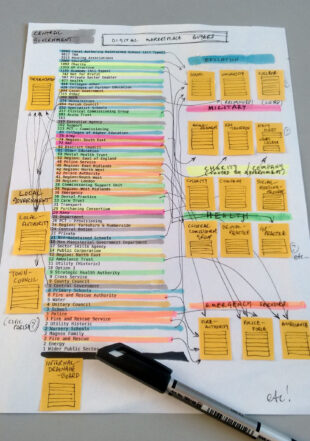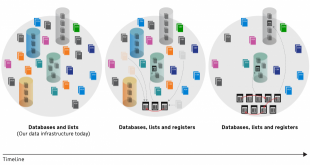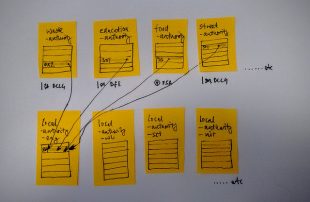
The Registers Design Authority is a small team focused on building a service to help quickly establish open registers across government. Like any digital team, we need to understand our users and how best to meet their needs.
Our primary users are custodians of registers, the people responsible for actually creating or overseeing the creation of core reference data. Our goal is to support custodians in increasing the trustworthiness of their data and make it easier for users of that data to access it.
Last year, the Data Leaders Network agreed that our initial focus should be on registers in the following 5 broad areas:
- countries and territories
- government organisations, including local authorities
- education
- businesses
- places
We blogged about this decision and how we planned to meet this goal at that time. Our incremental approach has given us the time and space to discover what works for custodians.
Tony Worron, custodian for the country and territory registers, has recently blogged about his experience of the register creation process. We’ve also blogged about how we’ve been working with Stephen McCallister, custodian of the local authority register for England.
The feedback has been great and has driven several changes. Some of these changes are captured in the history pages of individual registers. But we also wanted to share some of the other things we’ve learnt from our discovery phase, and talk a little about our next steps towards helping establish many more registers across government.
Custodians are essential and authoritative
The absence of a register often leads to a proliferation of lists of the same thing, offering conflicting and sometimes incorrect views of reality. Users don’t know which of the multiple lists created by multiple public and private sector organisations is being maintained. They don’t know which list to trust.
For example, we found several government organisations had created their own datasets of countries which had incorrect names for countries or conflated countries recognised by the UK government with territories needed for regulation. A number of publishers of duplicate lists of countries on GOV.UK now link or redirect to the country names page on GOV.UK because they trust the authority of the country register custodian.
Similarly, many existing data models of local authorities assume local government organisations are hierarchical rather than separate organisations who happen to serve the same geographical area, a misnomer which will cause even more confusion with the introduction of more combined authorities in England.
We learnt about the implications of these misconceptions through working with the people actually responsible for the things being listed — our users, the custodians.
Although we have looked ahead, sketching out registers using existing open data, we’ve developed a hard-rule in our process: a register cannot move into alpha without a custodian.
Registers are emergent

Government organisations emerging from the Crown Commercial Service list of customer URNs
Along with lots of duplication in data, there have been lots of attempts over the years to build a one true data model across government. Rather than becoming yet another centralised data modelling group, the role of the Registers Design Authority is to devise the service and standards to enable a large number of custodians to establish registers. We also assure registers’ compliance with these standards.
You can start to see what’s involved in this process in the history page maintained for each register. These document the how the register was created and how key decisions have been made.
The Registers Design Authority is itself a custodian of the field, datatype and register register. These registers, combined with the links between data, generate a model of how government data is actually managed, and will be more useful to us when establishing registers than any conceptual model we could design in advance.

The emergent register ecosystem
We can trust registers to annotate each other
A number of people have asked us for a single register of local authorities in the UK. But, as there is no single custodian with the authority to build such a register, it makes sense to break it down into 4 registers for England, Wales, Scotland and Northern Ireland. Stephen McAllister, from the Department for Communities and Local Government, is the custodian for the local authority England register, and we are working with other potential custodians to establish the other registers.
There is a field in the local authorities England register that contains the website for a local authority. Stephen is not involved in the process for issuing and tracking domains and websites, which are eligible to become registers in themselves. However, we can link from those registers to the local authority England register.
Similarly we can rely upon links from other registers to indicate when a local authority manages schools, inspects food businesses, or manages waste, rather than expecting Stephen to track facts outside of his remit.

Links between registers containing local authorities
Dependencies between registers
With so many links between registers, there’s a risk that slower progress on one register could block us on another. After some consideration and conversations with custodians we think it’s OK for a beta register to reference another emerging register so long as it uses an existing, stable, open identifier already in widespread use inside and outside of government — criteria used by the Open Standards Board. For example, this will allow us to move the school-trust register, which cites Companies House company numbers, into alpha without having to wait for the company register itself to be established.
Addresses are a special case as they appear as text in a lot of government datasets. Unfortunately there isn’t an open identifier, so for now we have elected to use a UPRN to identify an address while government explores options for an open address register, in line with commitments made earlier this year.
Custodians are brilliant, we need a lot more of them
The most important thing we learnt from discovery is how essential it is to work with the right custodian. So our next steps are to learn how to scale our process. We will to do this by continuing to work on registers which have emerged from our discovery phase. This includes finding and establishing the custodians for the following registers:
- countries, territories and the constituent units of the UK
- separate registers of local authorities in England, Wales, Scotland and Northern Ireland along with types of local authority
- schools in England, schools in Wales, and the related registers of school trusts, genders, religious characters and diocese
- school authorities in England
- central government organisations
- central government services, internet domains and websites
- job centres
- register offices
- prisons
- police forces
- fire authorities
- clinical commissioning groups
- food authorities
- street authorities
- types of industry and occupation
We’re working towards having at least 10 of these registers established with custodians in public beta in 2017.
2 comments
Comment by Sian Thomas posted on
This is very interesting and here at the Food Standards Agency we are appreciative of engagement with the work on registers to date. With responsibility across England, Wales and Northern Ireland we are pleased to see that the Local Authority Register will be extended - this will provide authoritative lists we can use across our work.
Clearly, the 'food authorities' piece is also of interest. And we look forward to future engagement.
Comment by Paul Downey posted on
Thanks Sian, we're indebted for all your help during our early discovery and learnt so much from working with you and your FSA colleagues. We also look forward to working with you to establish links, and increase the value of the network of 'authority' registers.